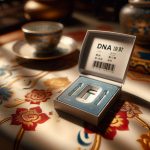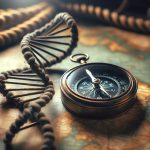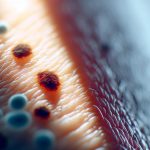Muhdo is at the forefront of offering bespoke wellness, physical fitness, and nutritional guidance based on an individual’s DNA. The organization is driven by a mission to encourage individuals towards a healthier lifestyle through achievable and lasting changes. In conversation with James Brown, the Nutrigenetics Director at Muhdo Health Ltd, we gleaned valuable insights into how genetic assessments can unveil deep-seated health information. Through such testing, along with understanding epigenetics—how our environment and choices affect gene expression—one can take informed steps toward enhancing their overall health and wellbeing.
Can you tell us about your history and what led to the creation of Muhdo?
My journey began on the rugby field, where I thrived until a major injury at 19 cut my professional career short. This setback redirected my path toward personal training and nutrition, leading me to dedicate 15 years to enhancing the physical condition of top-tier athletes globally. The drive to improve others’ well-being took a more personal turn when cystic fibrosis claimed the lives of two beloved cousins. This loss propelled me into the realm of genetics in 2010, seeking ways to combat such unforgiving diseases.
With Europe offering no specialized courses in genomics at that time, Australia became my destination for acquiring a rare qualification in nutritional genomics by 2015. Shortly after establishing my initial business venture, serendipity struck through repeated encounters with Nathan Berkley at health seminars; soon after, we co-founded Muhdo, marking a pivotal chapter in our pursuit of health optimization through genetics.
Can you explain how the tests you provide differ?
Understanding the difference between genetic and epigenetic analysis is crucial when considering DNA testing. Many companies offer tests that reveal genetic predispositions related to health, nutrition, and physical activity. Such tests are a one-time deal, providing insights into how your genes may impact your wellness.
However, Muhdo sets itself apart by offering something extra: epigenetic analysis. This cutting-edge approach allows you to see the real-time effects of your lifestyle on your genes and overall health. It’s not just about knowing what’s written in your DNA; it’s about seeing how everyday choices influence your genetic expression over time.
One of the most compelling aspects of Muhdo’s service is its ability to track changes throughout the year. By doing so, you can gauge how fast you’re aging on a biological level. This isn’t only limited to a single metric but extends to specific areas such as vision, hearing, and cognitive function.
What makes this truly valuable is the power it gives you to enact change. Armed with knowledge about how certain behaviors affect your biological age, you can make informed adjustments to slow down the aging process. Whether tweaking your diet or modifying exercise routines, these small changes could have significant impacts on delaying age-related decline.
In essence, while traditional DNA tests provide valuable snapshots of our genetic tendencies, Muhdo goes further by shedding light on our dynamic relationship with our genes. Through their innovative approach to epigenetic testing, Muhdo empowers individuals with actionable insights for healthier living—proving that knowledge really is power when it comes to managing one’s well-being.
Which DNA test do most people prefer, and why?

In the fascinating realm of health science, a breakthrough test known as epigenetic testing is shedding light on how we understand aging. This cutting-edge method doesn’t just look at how many candles you’ll blow out on your next birthday cake; rather, it dives deeper, unveiling your biological age. This figure goes beyond the calendar years to reveal the real condition of your cells and how well they’re holding up against time’s relentless march.
Most folks aren’t aware that we actually navigate life with two ages in tow – our chronological age, which ticks up each year without fail, and our biological age, a more telling gauge of our body’s true wear and tear. The latter gives us a peek into how lifestyle choices, diet, and even where we live can influence our cellular aging process.
Understanding our biological age serves as an eye-opener to our overall well-being. It acts like a health check-up without the doctor’s office visit. As we grow older and certain bodily functions begin to decelerate, knowing where you stand biologically could be crucial. It’s akin to having a personal health barometer at your disposal—offering insights that could motivate changes towards healthier living habits.
So next time you think about age, remember it’s not just about how long you’ve been around but also about how well your body is coping with the journey. The discovery and application of epigenetic tests are revolutionizing our approach to health maintenance and disease prevention—one cell at a time.
What can your tests reveal, and how might this transform people’s lives?
In the burgeoning field of epigenetics, researchers are uncovering fascinating insights, particularly in how lifestyle choices can impact our biological clocks. With an impressive dataset from approximately 2,500 individuals over two and a half years, patterns are emerging that link everyday habits to slowing down the aging process.
One standout discovery is the connection between regular dancing and improved memory performance as people age. It appears those who frequently hit the dance floor not only have fun but might also keep their minds sharper for longer. This finding underscores how incorporating joyous physical activity into one’s routine could be a secret weapon against cognitive decline.
Furthermore, creatine, a supplement well-known among fitness enthusiasts for boosting energy levels and enhancing muscle endurance, has been shown to offer more than just physical benefits. Regular intake of creatine doesn’t only fortify your gym sessions; it could also turn back the clock on your biological age. This revelation adds another layer to our understanding of anti-aging strategies and places greater emphasis on dietary supplements as potential allies in our quest for longevity.
These pieces of evidence point towards a holistic approach to health where diet, exercise, and even leisure activities like dancing play crucial roles in maintaining youthfulness both physically and mentally. As research in epigenetics continues to evolve, we’re reminded once again that the choices we make each day don’t just influence our present wellbeing but also shape our body’s ability to defy aging over time.
Can people make tailored changes based on their results to enhance their health and wellness?
When it comes to analyzing DNA, we explore 103 distinct regions. This scope is pretty standard across the board; however, our tests uniquely cover areas like anti-aging, eye health, and hearing capabilities. The real game-changer lies in epigenetics – a field that delves into how one’s lifestyle and environment can alter gene expression over time.
To tailor truly personal health advice, an extensive collection of data reflecting individual lifestyles and environmental exposures is crucial. It’s about piecing together a detailed picture of daily habits: from the number of steps taken to dietary intake of vitamins and minerals, right through to pollution exposure levels. Such comprehensive data gathering enables us to move beyond broad recommendations to deliver highly specific guidance tailored to each person.
As we approach the end of this year, our ability to offer personalized insights will reach new heights. While general advice on nutrition or exercise could benefit everyone, specifics matter; what works for one might not be as effective for another. For instance, you may require more vitamin D than others or need an extra ten minutes of walking compared to your friends.
This leap towards providing precise and individualized information signifies a significant advancement in how we understand and respond to our unique genetic makeup. Through such detailed analysis, we’re paving the way for personalized healthcare solutions that cater directly to individual needs.
Should DNA testing become a regular part of healthcare?
Absolutely, the effectiveness of DNA tests is up for debate. With hundreds of companies offering these services, accuracy can vary widely. The depth of analysis differs significantly from one provider to another. For instance, while some may examine fewer than a hundred genetic markers or SNPs related to health and wellness, others delve into a thousand targeted ones. This difference in approach is crucial for generating precise results.
Moreover, the reliability of these outcomes also hinges on the research and studies each company utilizes. It’s not uncommon for some to rely on outdated methodologies which might affect the quality of information you receive after testing. Therefore, navigating through this vast array of options requires careful consideration.
On top of genetic analysis that identifies potential health predispositions based on your DNA makeup, there’s something else worth considering: epigenetic analysis. Unlike genetics that set the stage, epigenetics play out through your lifestyle choices and environmental exposures influencing how those genes might actually express themselves over time.
Indeed, knowing your genetic likelihood for certain conditions is valuable; however, it only tells part of the story. It’s vital to understand both sides – predisposition and actual manifestation – as genes are not our destiny but rather indicators that can guide us towards healthier life decisions when paired with insights from epigenetic data.




















